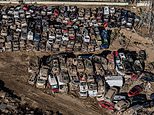
Dramatic new photos have revealed the extent of damage to cars in Valencia that were swept away in the deadly flooding late last month that killed over 200 people.
Nearly 100 people are still missing following the floods, which began after devastatingly heavy rain fell on the eastern Spanish region on October 28.
In one town just outside the city of Valencia, Chiva, more rain fell in eight hours than it had for the preceding 20 months.
The floods took a severe toll on the infrastructure in the region, and swept up countless cars in their wake.
The snaps, taken at a junkyard outside the Valencian city of Paiporta, show rows and rows of still-mud-caked vehicles stacked on top of each other. Many of them are missing major parts, including engine blocks, windscreens and entire doors.
One aerial shot showed an ambulance, with its roof dented and covered in mud, buried underneath an Opel coupe.
Nearly 100 people are still missing following the floods, which began after devastatingly heavy rain fell on the eastern Spanish region on October 28
The floods took a severe toll on the infrastructure in the region, and swept up countless cars in their wake
The snaps, taken at a junkyard outside the Valencian city of Paiporta, show rows and rows of still-mud-caked cars stacked on top of each other
The stacks were as high as six vehicles each, with the bottom cars often being the most severely damaged.
Despite the floods subsiding, the junkyard itself was still waterlogged, with many of the vehicles left to corrode in stagnant, shallow pools of water.
Spain’s Consortium for Insurance, a public-private entity that pays insurance claims for extreme risks like floods said that it had received 44,000 claims for motor vehicles damaged by the floods, with the number expected to rise as more and more people return to their homes.
Spaniards are up in arms over the regional and national government’s response to the floods.
As many as 130,000 people took to the streets of Valencia on Saturday to rage against the authorities.
Despite the floods subsiding, the junkyard itself was still waterlogged, with many of the vehicles left to corrode in stagnant, shallow pools of water
The stacks were as high as six vehicles each, with the bottom cars often being the most severely damaged
Many of them are missing major parts, including engine blocks, windscreens and entire doors
Protestors, accusing those in charge of issuing warnings far too late, chanted: ‘We are stained with mud, you are stained with blood.’
By the time authorities had send alerts to mobile phones, warning Spaniards to stay at home, many had already hit the roads that were soon submerged in water, massively increasing their risk of death.
Anna Oliver, one of the protest organisers, told Reuters: ‘We want to show our indignation and anger over the poor management of this disaster which has affected so many people.’
Protestors also clashed with police towards the end of the weekend’s demonstrations, and smeared mud into Valencia’s City Hall.
The city’s mayor, María José Catalá, posted pictures of broken windows and a video appearing to show a fire being started on social media, adding: ‘Vandalism is not the solution.’
A view of wrecked cars stored in a junkyard outside Paiporta after they were damaged by flooding in Valencia, Spain on November 10, 2024
The region remains in crisis after the floods, which have claimed 223 lives, with some people still unaccounted for.
Graffiti is seen on the facade of city hall during a demonstration to demand the resignation of Valencia Regional President Carlos Mazon in Valencia on November 9, 2024
Valencia City Council condemned ‘vandalism’, saying the city had also been affected by the floods.
Scientists trying to explain what happened see two likely connections to human-caused climate change.
One is that warmer air holds and then dumps more rain. The other is possible changes in the jet stream — the river of air above land that moves weather systems across the globe — that spawn extreme weather.
Climate scientists and meteorologists said the immediate cause of the flooding is called a cut-off lower-pressure storm system that migrated from an unusually wavy and stalled jet stream.
That system simply parked over the region and poured rain. This happens often enough that in Spain they call them DANAs, the Spanish acronym for the system, meteorologists said.
Protesters confront police in front of city hall during a demonstration to demand the resignation of Valencia Regional President Carlos Mazon in Valencia on November 9, 2024
Demonstrators kick at the entrance to city hall as a flare is lit during a demonstration to demand the resignation of Valencia Regional President Carlos Mazon in Valencia on November 9, 2024
And then there is the unusually high temperature of the Mediterranean Sea. It had its warmest surface temperature on record in mid-August, at 28.47 degrees Celsius (83.25 degrees Fahrenheit), said Carola Koenig of the Centre for Flood Risk and Resilience at Brunel University of London.
The extreme weather event came after Spain battled with prolonged droughts in 2022 and 2023. Experts say that drought and flood cycles are increasing with climate change.
‘Climate change kills, and now, unfortunately, we are seeing it firsthand,’ Spanish president Pedro Sánchez said after announcing a 10.6-billion-euro relief package for 78 municipalities.





